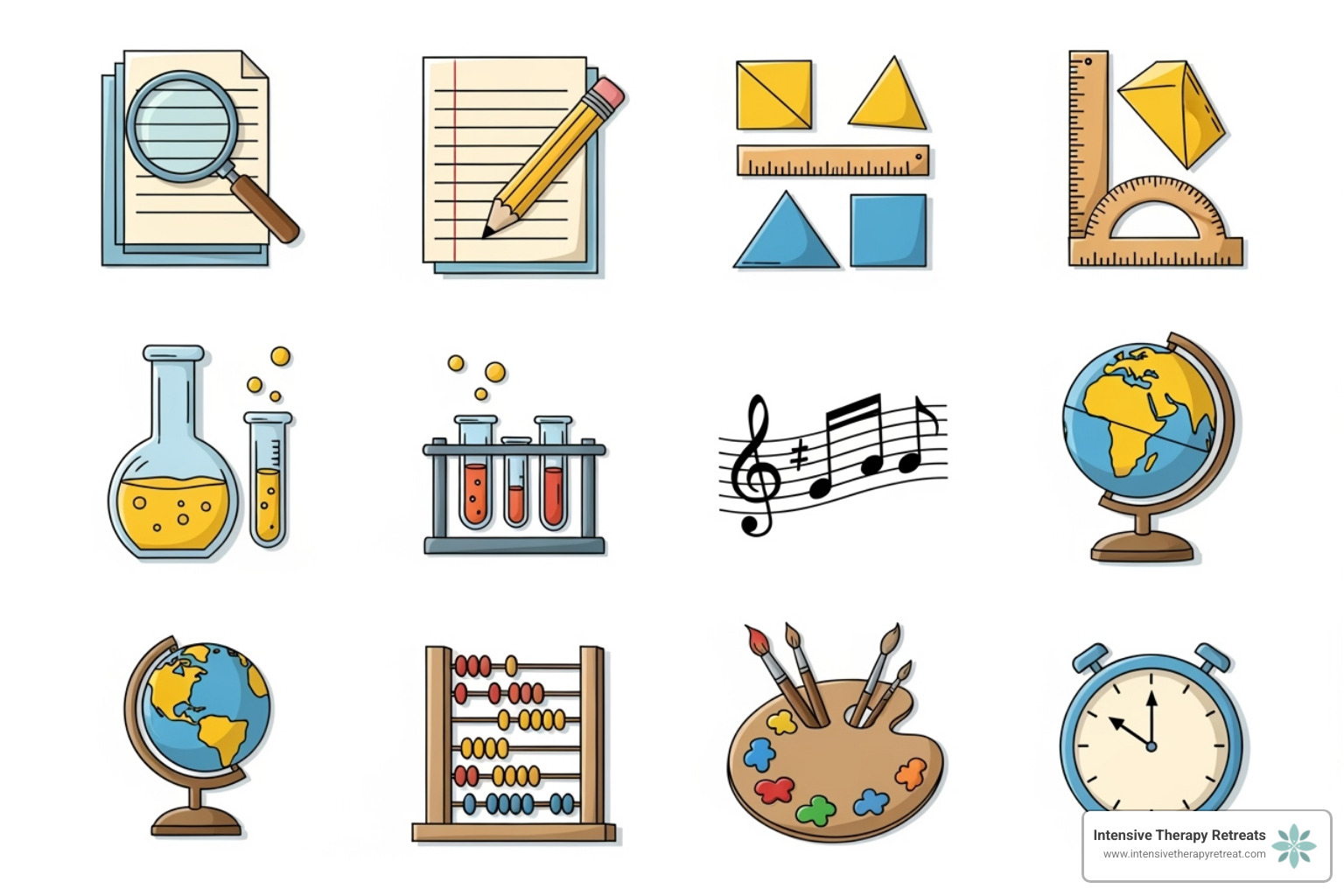Understanding Your Inner World with Internal Family Systems
IFS worksheets pdf resources offer practical tools to explore and heal your internal world through the groundbreaking Internal Family Systems therapy model. Whether you’re seeking foundational parts identification exercises, self-leadership assessments, or trauma exploration guides, these downloadable worksheets provide structured pathways to understanding your inner family system.
Quick Access to IFS Worksheets:
- All Parts Are Welcome – Initial parts identification and welcoming exercise
- The Six Fs Worksheet – Framework for getting to know your protective parts
- Understanding Our Relationship With a Part – Deepening connection with specific parts
- What the Self Is and Isn’t – Exploring the 8 C’s of Self-leadership
- Identifying Managers and Firefighters – Distinguishing your protective parts
Internal Family Systems, developed by Dr. Richard Schwartz, recognizes that we all have multiple “parts” within us – distinct aspects of our personality that developed to help us steer life’s challenges. At the center of this system is your Self – your core essence characterized by qualities like curiosity, compassion, and calm.
These parts include Managers (our proactive protectors), Firefighters (our reactive protectors), and Exiles (vulnerable parts carrying our deepest wounds and needs). When we learn to access Self-leadership, we can build healing relationships with all our parts, leading to greater wholeness and emotional freedom.
The beauty of IFS lies in its fundamental belief that there are truly “No Bad Parts” – each aspect of ourselves developed with positive intent, even if their methods sometimes cause us distress.
I’m Bambi Rattner, Psy.D, and through decades of clinical experience including extensive training in trauma therapies like EMDR, I’ve witnessed how IFS worksheets pdf resources can serve as powerful bridges between therapy sessions, helping clients develop deeper self-awareness and compassion for their inner world. These tools have proven invaluable in my intensive retreat work, where clients often experience profound breakthroughs in understanding and healing their internal family systems.
The Role of IFS Worksheets in Healing and Self-Findy
Picture your inner world as a busy household where different family members each have their own personalities, concerns, and ways of trying to help. Sometimes they work together beautifully, and other times… well, let’s just say family dinners can get interesting. IFS worksheets pdf resources serve as your gentle guides for getting to know each of these inner family members better.
These worksheets aren’t just pieces of paper with questions – they’re bridges that connect you to deeper self-awareness and genuine self-compassion. When you sit down with an IFS worksheet, you’re creating space to listen to parts of yourself that might have been trying to get your attention for years.
One of the most powerful aspects of using IFS worksheets pdf is how they help you identify your parts with curiosity rather than judgment. That inner critic that never seems satisfied? That’s likely a Manager part working overtime to keep you safe from failure. The part that wants to binge-watch Netflix when you’re stressed? Probably a Firefighter trying to soothe overwhelming feelings.
Bridging therapy sessions becomes natural when you have these tools at your fingertips. Between appointments, you can continue the conversation with your parts, deepening insights and maintaining the momentum of your healing journey. This consistent engagement helps the work stick in ways that once-a-week sessions alone sometimes can’t achieve.
The worksheets excel at helping you understand inner conflict – those moments when you feel pulled in completely different directions. Instead of feeling frustrated by these competing voices, you begin to see them as parts with different but equally valid concerns. The part pushing you to work harder and the part begging for rest both want good things for you.
Accessing the Self – your core essence of wisdom and compassion – becomes more natural through guided worksheet exercises. Your Self embodies the 8 C’s of Self-Leadership: Curiosity about your inner world, Calm presence with difficult emotions, Confidence in your ability to lead your inner family, and Compassion for all your parts – especially the wounded ones.
These practical tools create a structured yet gentle way to explore your internal landscape, supporting both formal therapy work and personal growth journeys.
To learn more about how this powerful model works, explore our guide on How Does Internal Family Systems Therapy Work?
A Guide to Free and Printable IFS Worksheets PDF Downloads
Starting your IFS journey doesn’t have to break the bank. One of the most beautiful aspects of Internal Family Systems work is how accessible it can be. Practitioners and organizations around the world have generously shared free, printable ifs worksheets pdf resources that make it possible for anyone to begin exploring their inner world.
Think of these worksheets as your personal toolkit for internal exploration. Some help you meet your parts for the first time, while others guide you into deeper conversations with specific aspects of yourself. Whether you’re just curious about IFS or actively working with a therapist, these resources can support your healing journey.
Let’s walk through some of the most helpful ifs worksheets pdf downloads available, organized by where you might be in your IFS journey.
Getting to Know Your Parts: Foundational Worksheets
Hearing about having “parts” might feel strange at first, which is normal. These foundational worksheets help make the abstract concept of parts feel real and approachable.
The All Parts Are Welcome worksheet is a gentle exercise inviting you to acknowledge every aspect of yourself, even the parts you dislike. It helps you welcome your inner critic or the part that procrastinates. This worksheet creates a foundation of acceptance essential for healing. When parts feel welcomed, not judged, they are more willing to share their true purpose, fostering a sense of inner belonging.
Download the All Parts Are Welcome worksheet
Parts can communicate visually through colors or shapes. The Identifying Parts of Yourself Through Drawing worksheet uses this visual language. Artistic skill isn’t required; it’s about letting parts express themselves visually. You might be surprised by what emerges. An anxious part could appear as a child, or a perfectionist part as a stern teacher. These visuals can reveal insights that verbal exercises miss.
Download the Identifying Parts of Yourself Through Drawing worksheet
Differentiating Your Protectors: Managers and Firefighters
Once you start recognizing your parts, you’ll likely notice that many of them seem to be working overtime to keep you safe. These are your protective parts, and understanding their different styles can be incredibly helpful.
The Six Fs worksheet offers a structured way to get to know any protective part. This framework walks you through six steps: Find the part, Focus on it, Flesh out its characteristics, Feel how you relate to it, Befriend it, and understand what it Fears would happen if it stopped its protective job.
This process helps you shift from frustration with a part to understanding its positive intention. It’s like finally having a real conversation with a misunderstood aspect of yourself.
Not all protectors work the same way. Managers are your proactive protectors – they try to control situations before problems arise. Think of the part that makes detailed to-do lists, or the one that works extra hard to make sure everyone likes you. Firefighters, on the other hand, are reactive protectors that spring into action when you’re already in emotional pain. They might show up as the part that reaches for comfort food, binge-watches shows, or gets angry when you feel hurt.
The Identifying Managers and Firefighters worksheet helps you recognize these different protective strategies. Understanding whether a part is trying to prevent pain or soothe existing pain can completely change how you relate to it.
Download the Identifying Managers and Firefighters worksheet
Deepening the Relationship with Your Parts
As you become more familiar with your internal family, the real healing happens in building genuine relationships with individual parts. This is where the work gets deeper and more transformative.
The Understanding Our Relationship With a Part worksheet guides you into a meaningful dialogue with a specific part. It helps you understand what a part does, why it does it, and how it feels about its role. Many parts are tired of their jobs but don’t know how to step back safely.
This worksheet helps you explore the burdens your parts carry, such as old beliefs or painful emotions. For example, a perfectionist part might carry the belief “I’m not good enough,” or a people-pleasing part might fear abandonment.
Download the Understanding Our Relationship With a Part worksheet
Accessing Self-Energy: Free ifs worksheets pdf
The heart of IFS work is learning to lead your internal system from your Self – that calm, curious, compassionate center that exists within everyone. This isn’t another part; it’s your core essence that naturally knows how to care for all your parts.
The What the Self Is and Isn’t worksheet helps you recognize and strengthen your connection to Self-energy. It explores the eight C’s of Self-leadership: Curiosity about your parts rather than judgment, Calmness even in difficult moments, Confidence in your ability to handle challenges, Compassion for all aspects of yourself, Courage to face difficult truths, Clarity about what’s really happening, Creativity in finding solutions, and Connectedness to yourself and others.
This ifs worksheets pdf resource helps you assess your access to these qualities and identify where parts might be blocking your natural Self-leadership.
Download the What the Self Is and Isn’t worksheet
These worksheets are designed to support you in becoming the wise, compassionate leader your internal family has been waiting for. This work takes time and patience – be gentle with yourself as you explore.
Who Can Benefit from Using IFS Worksheets?
The wonderful thing about IFS worksheets pdf resources is that they’re designed for everyone. Since Internal Family Systems recognizes that we all have different parts within us, these tools can help anyone who wants to understand themselves better or find more inner peace.
Think about it – we all have that inner critic that shows up at the worst times, or that part of us that just wants to stay in bed when life gets overwhelming. These are normal human experiences, and IFS worksheets pdf resources help us make sense of them in a compassionate way.
If you’re someone who loves personal growth and self-findy, these worksheets offer a structured path to explore your inner world. They can help you understand why you might procrastinate, why certain situations trigger strong reactions, or why you sometimes feel pulled in different directions. It’s like having a roadmap to your own mind.
Many people find these resources particularly helpful when they’re struggling with specific challenges. Those dealing with anxiety often find parts of themselves that are working overtime to keep them “safe” from perceived threats. People experiencing depression might connect with parts that have been carrying sadness or shame for years, finally giving these wounded aspects of themselves the attention they deserve.
IFS worksheets pdf resources have proven especially valuable for trauma recovery. Whether someone is dealing with PTSD from a specific event or complex trauma from childhood experiences, these tools provide a gentle way to approach healing. They help people identify protective parts that developed to cope with difficult situations, while also safely connecting with the more vulnerable parts that carry pain.
The approach works beautifully for eating disorders and substance use challenges too. Instead of seeing these behaviors as “bad” or “wrong,” IFS helps people understand them as parts trying to protect or soothe in the only way they know how. This compassionate perspective often opens the door to real healing.
Even grief becomes more manageable when we understand it through an IFS lens. Rather than trying to “get over” loss, these worksheets help people honor the parts of themselves that are grieving while also staying connected to their core Self that can provide comfort and wisdom.
What makes IFS so special is that it doesn’t label anyone as “broken” or “disordered.” Instead, it sees our struggles as evidence of parts that are working hard to protect us, even when their methods aren’t serving us well anymore. This shift in perspective – from pathology to protection – can be incredibly healing all by itself.
Whether you’re dealing with phobias that seem to come out of nowhere, relationship patterns that keep repeating, or simply want to develop more self-compassion, these worksheets meet you wherever you are in your journey.
For a deeper dive into the specific conditions IFS can help with, explore our detailed resource: More info about Various Mental Health Conditions That IFS Can Help With
Best Practices for Using IFS Worksheets (Especially for Trauma)
While IFS worksheets pdf resources can be incredibly healing tools for self-exploration, approaching them thoughtfully is essential—especially when trauma is part of your story. Think of these best practices as your gentle guide to making the most of your inner work while keeping yourself safe.
Start with curiosity, not judgment. This is crucial for IFS work. When using worksheets, approach your parts as if meeting them for the first time, with genuine interest, not criticism. Every part has a positive intent, even if its actions cause problems. Your inner critic might be protecting you from failure, while a procrastinating part could be shielding you from feeling inadequate.
Patience is your friend. Healing takes time. Some parts have been protecting you for decades and won’t trust you overnight. It’s normal to feel stuck or not get clear answers from a worksheet. Simply showing up consistently and asking gentle questions builds trust within your system.
When trauma is involved, safety comes first. Foundational IFS worksheets pdf are great for getting to know your protective parts (your Managers and Firefighters). However, approaching Exiles—those vulnerable parts holding your deepest pain—requires extra care. These parts carry our traumatic memories, childhood wounds, and overwhelming feelings that our protectors have worked so hard to keep locked away.
If you have a trauma history, please consider working with a trained IFS therapist when you’re ready to connect with your Exiles. When these parts share their stories, the emotions can be overwhelming. A therapist provides support, helps you pace the work, and prevents you from being flooded or re-traumatized, ensuring you stay grounded.
Worksheets are tools, not therapists. These resources can bridge therapy sessions and provide concrete ways to continue your inner work. They’re fantastic for building self-awareness, tracking patterns, and preparing for deeper therapeutic conversations. But they can’t replace the dynamic guidance of a human being who understands trauma and the IFS model.
Listen to your body and your system. Pay attention to physical sensations as you work through exercises. Tension, relaxation, shallow breathing, sleepiness, or anxiety are all important messages. If you feel overwhelmed, it’s okay to take a break. Honoring your parts’ needs builds trust.
Integration is key. Don’t just fill out worksheets and file them away. Reflect on what you’ve learned. How does understanding your Manager parts change how you view perfectionism? How can you bring more Self-energy into daily interactions? Real healing occurs when these insights change how you treat yourself and others.
For those ready to explore how IFS specifically addresses trauma healing, you’ll find valuable insights in our guide on IFS for Trauma. And if you’re curious about the brilliant mind behind this approach, learn more about The work of Dr. Richard Schwartz, Developer of the IFS Method.
Professional guidance isn’t a sign of weakness—it’s a sign of wisdom. Your healing journey deserves the support and safety that comes from working with someone trained to help you steer the beautiful complexity of your inner world.
Frequently Asked Questions about IFS Worksheets
We understand that diving into IFS and its practical tools might bring up some questions. Here are answers to some of the most common inquiries we receive about IFS worksheets pdf resources.
Can I use these ifs worksheets pdf on my own?
Yes, many IFS worksheets pdf are perfect for self-exploration. They are gentle guides for getting to know your inner world. Worksheets for initial parts identification, understanding the 8 C’s of Self-energy, and basic self-reflection are great for independent use.
However, safety and pacing are crucial. If you have a history of significant trauma, be extra careful. For deep trauma work, especially with vulnerable Exile parts that carry pain, professional guidance from a trained IFS therapist is essential.
Accessing these tender parts can bring up overwhelming feelings. A therapist provides a safe container, helps pace the work, and guides you through challenges, ensuring you don’t get flooded by emotions you’re not ready to handle alone.
What’s the difference between a Manager, a Firefighter, and an Exile?
Understanding these three types of parts is like learning the cast of characters in your inner world. Each has a distinct personality and job description:
Managers are your proactive protectors – think of them as the planners and controllers of your internal system. They work tirelessly to keep you safe by managing your environment, thoughts, and behaviors. You might recognize them as your inner perfectionist, people-pleaser, or that part that overthinks everything. They’re constantly on guard, trying to prevent any situation that might activate your vulnerable parts.
Firefighters are your reactive protectors – they’re the emergency responders who spring into action when an Exile’s pain threatens to overwhelm you. When emotional pain feels too intense, Firefighters jump in with immediate solutions: binge eating, substance use, anger outbursts, or diving into distracting behaviors. They don’t care about long-term consequences; their job is to put out the emotional fire right now.
Exiles are the tender, often young parts that carry your deepest wounds. They hold the pain, trauma, shame, and difficult memories from past experiences. Both Managers and Firefighters work overtime to keep Exiles safely tucked away because their pain can feel overwhelming to your system.
The beautiful goal of IFS is helping your Self build trust with your protective parts so they can relax a bit, allowing you to compassionately approach and heal those precious Exiles.
How often should I use these worksheets?
There’s no rigid schedule for using IFS worksheets pdf. The best approach is to listen to your internal system and do what feels right.
Consistency is more effective than intensity. Dedicating 10-15 minutes a few times a week can be manageable and nourishing. Regular, gentle attention often yields the best results.
Pay attention to when a part is activated – these moments are golden opportunities for worksheet exploration. Notice yourself procrastinating? That might be a Manager trying to protect you from potential failure. Feeling overwhelmed? Perhaps an Exile is close to the surface. These are perfect times to grab a relevant worksheet and explore what’s happening internally.
If you’re working with a therapist, using worksheets between sessions can deepen your understanding and give you rich material to bring to your next appointment. It’s like doing homework that actually feels meaningful.
Most importantly, listen to your system. If you feel tired, overwhelmed, or resistant, your parts may need a break. Pushing through can be counterproductive. If you feel curious and energized, follow that momentum.
This is about building a loving relationship with your inner family. And just like any relationship, it thrives on consistent, gentle attention rather than forced interactions.
Conclusion: Integrating Your Inner Family for Lasting Wholeness
As we reach the end of our exploration into IFS worksheets pdf resources, it’s clear that these tools offer far more than simple exercises—they provide pathways to profound self-understanding and healing. Throughout this journey, we’ve finded how these downloadable resources can help us identify our Managers (those tireless protectors working behind the scenes), recognize our Firefighters (the parts that rush in when we’re overwhelmed), and gently approach our Exiles (the vulnerable parts carrying our deepest wounds).
The beauty of this work lies in IFS’s fundamental truth: there are truly “No Bad Parts.” Every aspect of ourselves, even those we’ve criticized or tried to silence, developed with love and positive intent. When we approach our inner family with the curiosity, compassion, and calmness that flow from our Self, something magical happens—we begin to heal from the inside out.
These IFS worksheets pdf resources serve as bridges between therapy sessions and daily life, helping us develop the self-compassion that so many of us struggle to find. Whether you’re working through anxiety, depression, trauma, or simply seeking deeper self-awareness, these tools provide structured yet gentle ways to explore your inner landscape.
The healing journey isn’t always linear, and sometimes we need more intensive support to create lasting change. For those seeking to accelerate their healing from trauma in a safe, structured environment, an immersive approach can lead to profound and lasting change. Our intensive therapy retreats combine the wisdom of IFS with other proven trauma therapies, creating opportunities for significant breakthroughs in days rather than months or years.
We believe deeply in your capacity to become the compassionate leader of your own inner world. When your Self is in leadership—guided by those eight beautiful C’s of curiosity, calmness, confidence, compassion, courage, clarity, creativity, and connectedness—your entire system can find the harmony it’s been seeking.
Your inner family is waiting to be known, understood, and loved. These worksheets are simply the beginning of that beautiful relationship.



